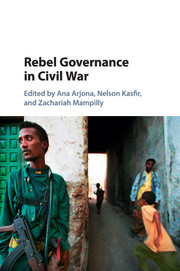Book contents
- Half title page
- Title page
- Copyright page
- Contents
- Contributors
- Book part
- 1 Introduction
- 2 Rebel Governance – Constructing a Field of Inquiry: Definitions, Scope, Patterns, Order, Causes
- 3 Del Gobierno de Abajo al Gobierno de Arriba …and Back: Transitions to and from Rebel Governance in Latin America, 1956–1990
- 4 Performing the Nation-State: Rebel Governance and Symbolic Processes1
- 5 Rebel Diplomacy: Theorizing Violent Non-State Actors’ Strategic Use of Talk
- 6 Rebel Governance During the Greek Civil War, 1942–1949
- 7 Comparing Rebel Rule Through Revolution and Naturalization: Ideologies of Governance in Naxalite and Naga India
- 8 Myths Set in Motion: The Moral Economy of Mai Mai Governance
- 9 Civilian Resistance to Rebel Governance1
- 10 Dialogue Direct:Rebel Governance and Civil Order in Northern Côte d’Ivoire
- 11 The Rebel State in Society: Governance and Accommodation in Aceh, Indonesia1
- 12 Organization and Governance: The Evolution of Urban Militias in Medellín, Colombia
- 13 Predatory Rebellions and Governance: The National Patriotic Front of Liberia, 1989–1992
- 14 Conclusion
- Index
- References
8 - Myths Set in Motion: The Moral Economy of Mai Mai Governance
Published online by Cambridge University Press: 05 October 2015
- Half title page
- Title page
- Copyright page
- Contents
- Contributors
- Book part
- 1 Introduction
- 2 Rebel Governance – Constructing a Field of Inquiry: Definitions, Scope, Patterns, Order, Causes
- 3 Del Gobierno de Abajo al Gobierno de Arriba …and Back: Transitions to and from Rebel Governance in Latin America, 1956–1990
- 4 Performing the Nation-State: Rebel Governance and Symbolic Processes1
- 5 Rebel Diplomacy: Theorizing Violent Non-State Actors’ Strategic Use of Talk
- 6 Rebel Governance During the Greek Civil War, 1942–1949
- 7 Comparing Rebel Rule Through Revolution and Naturalization: Ideologies of Governance in Naxalite and Naga India
- 8 Myths Set in Motion: The Moral Economy of Mai Mai Governance
- 9 Civilian Resistance to Rebel Governance1
- 10 Dialogue Direct:Rebel Governance and Civil Order in Northern Côte d’Ivoire
- 11 The Rebel State in Society: Governance and Accommodation in Aceh, Indonesia1
- 12 Organization and Governance: The Evolution of Urban Militias in Medellín, Colombia
- 13 Predatory Rebellions and Governance: The National Patriotic Front of Liberia, 1989–1992
- 14 Conclusion
- Index
- References
Summary
Rebels may set myths into motion when they govern civilians. Rebels who want to overturn the socio-political order often incorporate its values, beliefs, representations, and practices into their governance of civilians. In doing so they govern through some of the myths underpinning that order. Many of these operate on an unreflective level among both rebels and local residents. Deploying these enables rebels to cultivate legitimacy among civilians whose support they solicit. But the novelty of rule by rebels is that it recasts existing values and beliefs into new political narratives that shape rebel governance profoundly. Drawing on a mixture of nationalist, pre-colonial, and Christian values and beliefs, General Padiri’s Mai Mai militia group from South Kivu in eastern Congo produced a mythical narrative, forged around divine authority and the bipolar relation between autochthony and foreignness. This syncretic mythical narrative resonated deeply within the local society. It endowed Padiri with charismatic authority and enabled a highly centralized, authoritarian, and coercive form of rebel governance.
… very frequently the “world images” that have been created by “ideas” have, like switchmen, determined the tracks along which action has been pushed by the dynamic of interest.
(Weber 1948: 280)- Type
- Chapter
- Information
- Rebel Governance in Civil War , pp. 158 - 179Publisher: Cambridge University PressPrint publication year: 2015
References
- 19
- Cited by



